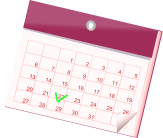(For past entries of the diary check here: One, Two, Three, and Four)
*Disclaimer: This is not an exhaustive how-to for novel writing, just a few things I learned along the way. Also, for those of you who are worried that I’m going to prattle on indefinitely, don’t panic. This series will come to a conclusion after a few more episodes.
In the last post, I was saying how important it is to choose the right location for your story and to be accurate and consistent in your descriptions. Well, accuracy and consistency should be maintained in other areas of writing, too. This means doing your homework. I’m not going to try and list a whole bunch of sources for you to use as references, because let’s face it, your genre and subject matter will determine the type of research you’ll need to do. Nonetheless, let’s just take a look at some things you should research, so you don’t get caught looking foolish by your savvy readers.
- Dates and times– Not exactly research, this is more like record keeping. Have
 you ever read a story where everything seems to have happened way too fast? And you realize it really did? For example, no one falls in love, gets married and has children in the span of a week or even a month! Make sure you place appropriate time gaps in the plot and keep track of them. This is where your timeline spreadsheet is a huge help. Add in dates where nothing is happening. It’s perfectly ok to say something like, “The whole month of October, we waited for a break in the investigation, but by November, the police had exhausted all their leads.” Now, pick up the action in the beginning of November.
you ever read a story where everything seems to have happened way too fast? And you realize it really did? For example, no one falls in love, gets married and has children in the span of a week or even a month! Make sure you place appropriate time gaps in the plot and keep track of them. This is where your timeline spreadsheet is a huge help. Add in dates where nothing is happening. It’s perfectly ok to say something like, “The whole month of October, we waited for a break in the investigation, but by November, the police had exhausted all their leads.” Now, pick up the action in the beginning of November.  Weather– This is sort of related to dates and times in that, if the story is set in a locale where the weather changes with the seasons, your characters might be sweating in the heat of the afternoon, raking the leaves from the front yard, shoveling snow from the walkway, running for the door in the rain, etc. Remember, you’ll need to dress your characters appropriately. No one wears a coat in June in Pennsylvania for instance. Weather.com has all sorts of weather data for cities all over the globe. It takes a minute to check and make sure.
Weather– This is sort of related to dates and times in that, if the story is set in a locale where the weather changes with the seasons, your characters might be sweating in the heat of the afternoon, raking the leaves from the front yard, shoveling snow from the walkway, running for the door in the rain, etc. Remember, you’ll need to dress your characters appropriately. No one wears a coat in June in Pennsylvania for instance. Weather.com has all sorts of weather data for cities all over the globe. It takes a minute to check and make sure.- Transportation– Maybe I’m the only wacko that this would bother but, check train schedules, bus schedules and flight times for airlines if you are using them. Does the airline you’re using really have flights into that city? Are there bus stops on the corner in that part of town? Here’s an example: In Seeing Red, my second book, my group of friends goes into Philadelphia to hear a band play at a bar. Initially, I had the group take the train into the city because I didn’t want them drinking and driving. I realized, however, that the last train leaves the city at midnight for the suburbs. That’s too early in the evening for what I wanted to happen upon their arrival back home. Rather than ignore the fact that the trains don’t run at 2 AM, I changed the action so that one of the friends became the designated driver, allowing them to stay in the city until the bar had closed.

- Historical accuracy– If you are writing about an actual event or series of events in history, even if it’s only a backdrop to your story, check your facts. Get the sequence of events straight. And don’t make up statistics! Seriously, in this day and age when we have information at our fingertips, there is no excuse for being sloppy! And it doesn’t have to be exhaustive research, just Google the subject and choose a reliable source. A word about Wikipedia. Even if you don’t fully trust Wikipedia, you can use it as a starting point. The references for their articles are listed at the bottom of the page. Yes, it’s an extra step, but worth the trouble if you’re not sure.
 Pop culture– Here’s an area where your story can get a dated feel to it. Mentioning music, film and TV shows will solidly place your story in a particular time period. Paris Hilton is so yesterday. Just saying.
Pop culture– Here’s an area where your story can get a dated feel to it. Mentioning music, film and TV shows will solidly place your story in a particular time period. Paris Hilton is so yesterday. Just saying.- Politics, government and laws– I can’t speak for other nations around the world, but here in the USA, our laws may vary slightly from state to state. For example, in Pennsylvania you can’t buy beer or wine at supermarkets and convenience stores (Fascists!), although thanks to Wegman’s, this is beginning to change. The States all have websites that you can check for the laws in each one.
- Culture– This is especially important if you are writing a story set in a country (or even a region of your own country) that may have a different ethnic diversity, political ideology, religion (or lack thereof), standard of living or level of technological development.
Have I covered everything you could possibly need to research? Not a chance. I hope at least this was a helpful start. I guess all I’m saying is, take the time to write the story right. Inaccuracy ruins a book for me, no matter how great the plot is. So do your homework, people! Next time, a few words about proof reading, editing and beta readers.


I had to mention a flight in my book. I jumped online, found the depart and land times, did the math and mentioned the number of hours in my book. My writer’s group all felt the time was too long. I couldn’t figure out why until I realized I didn’t take time zones into account. So for anyone writing about international travel, keep that in mind too 🙂
LikeLiked by 3 people
YES! Good one!
LikeLiked by 1 person
Ooops! Names of cities and towns. In the contemporary crime fiction I write it seems self evident. Real towns are right there on the map. Fictional towns are even easier. But when I wrote my historical novel all bets were off. Even some of the research sites had it wrong. A little digging and I had to go back and make the changes in the manuscript. What I learned? Multiple sources. And the internet is fine BUT…
LikeLiked by 1 person
Oh absolutely! Check and double check! And there ain’t nothin like the good old library!
LikeLiked by 1 person
I cannot tell you how much it irks me when there are inconsistencies like that in books. I always thought it was just me, but I bet lots of people notice the little details!
LikeLiked by 1 person
Yes Ma’am!
LikeLiked by 1 person
A good editor is useful for errors like this because a 10K draft will have some. Timelines and the little details are there to test us and if we get it wrong, readers are unforgiving. I am much more considerate as a reader now I’m a writer.
Looking forward to the next episode
LikeLiked by 1 person
A professional editor is on my wish list! I’ll talk about that subject next time. For the time being, I’m self editing and using beta readers! I’m fortunate to have a friend who’s a high school English teacher. His advice has been priceless!
LikeLiked by 2 people
Lucky you
LikeLiked by 1 person
Don’t forget about the common expressions and/or slang used in the location and time period you write about. It’s amazing to me that you can check all of this online. What a world!
LikeLiked by 1 person
Right!
LikeLiked by 1 person
Taking notes from your posts all the way! But this time I am glad, ‘coz everything you have written above is what I am doing for my research, so yaay…doing something right! 😀
LikeLiked by 1 person
Some of it is common sense, but you’d be surprised at some of the discrepancies I’ve found in other books! It makes me cringe! I’m so glad this is helpful! Are you prepping for NaNo? Or is this for Because Love?
LikeLiked by 1 person
Yes sometimes the most common aspect is what becomes the biggest mistakes because it tends to get overlooked.
This is for Because Love. The NaNo prep is going on too, but I’m taking it like a practice session.
LikeLiked by 1 person
I’m excited for you!
LikeLiked by 1 person
Meg, I am a nerd. But I love the research part of writing. One of my novels takes place in the 90s and the diary goes back to Cuba in the 1950s before Fidel Castro’s take over. The 90s research was to confirm the latest weapons, cars, and cell phones. The 50s research was incredible. I love this diary section. Fell like a pig in……mud.
LikeLiked by 1 person
Boy, Meg. That last line came out all wrong. My dad used to say happier than a pig in mud. Butchered that one. lol
LikeLiked by 1 person
Hahaha! I knew what you meant! I loved the research, too. A character in book one is from the Czech Republic; having escaped the communists at the end of WW2, he settles in French wine country…… Anyway, I got really wrapped up in that research, let me tell you!
LikeLiked by 1 person
I understand. Love this diary. I could spend my day hiding in here.
LikeLiked by 1 person
You are making my day, Andrew! Thank you so much!
LikeLiked by 1 person
How often do you post these? And I am not finished yet.
LikeLiked by 1 person
It’s a regular Wednesday feature. Sunday is for short stories (I use song lyrics for inspiration)
LikeLiked by 2 people
Wednesday. Great.
LikeLiked by 1 person
This is a great list that I have saved. I will return to my novels I have developed to include issues of weather. cultural references of the time along with researching more details. Thanks for a great posting! 🙂
LikeLiked by 1 person
Thank you so much! I appreciate you stopping by!
LikeLiked by 1 person